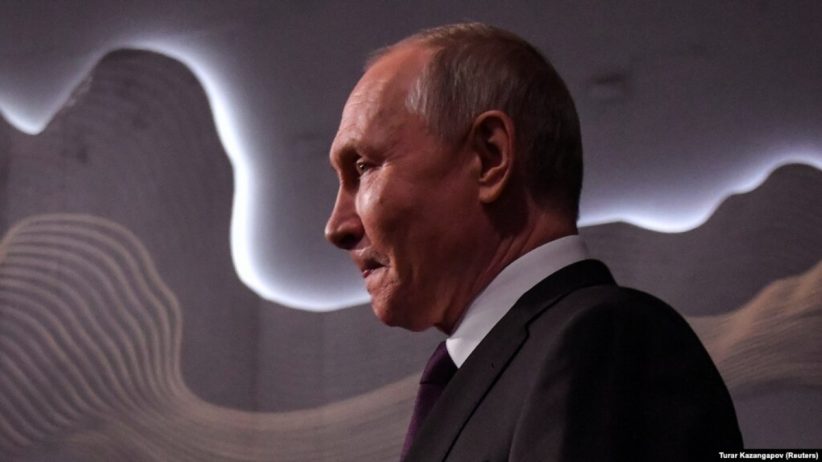By Ani Avetisyan
As Azerbaijan launched a large-scale assault Tuesday on Nagorno-Karabakh, shelling military positions and civilian infrastructures, Russian officials moved to blame Armenia and its recognition of Azerbaijan’s territorial integrity for the hostilities.
In response to the Armenian Foreign Ministry’s statement calling on the UN Security Council and the Russian peacekeeping forces to “take measures” to stop Azerbaijan’s hostilities, Russia’s foreign ministry spokesperson Maria Zakharova asked:.
“How about the official recognition of Nagorno-Karabakh in Azerbaijan?”
On her Telegram channel, Zakharova also denied Azerbaijan’s claims that the Russian peacekeeping forces were informed about the “anti-terror” operation it planned in Nagorno-Karabakh. In an apparent setback, the Kremlin spokesperson, Dmitry Peskov later stated he “cannot confirm” that Moscow was informed about the attack, refusing to deny it.
Azerbaijan’s attack in Karabakh started Tuesday afternoon and killed at least 27 and wounded over 200, forcing over 7000 out of their houses from 16 communities in Martuni, Markatert, Askeran, and Shushi regions.
Past midnight on Wednesday, the Russian Foreign Ministry issued a statement, calling on the “conflicting parties to immediately stop the bloodshed, stop hostilities and eliminate civilian casualties”. It once again blamed Armenia for recognizing Nagorno-Karabakh as part of Azerbaijan, noting that his act “changed the fundamental conditions” under which the November 9, 2020 was signed, “as well as the position of the Russian peacekeeping contingent”.
“Even during these hours, Russian peacekeeping contingent provides assistance to the civilian population, including medical aid, and is engaged in the evacuation,” the statement read.
Additionally, Andrei Kartapolov, the Chairman of the State Duma Committee on Defense, stated that Russian peacekeepers are not authorized to take part in military operations “as long as the peacekeepers themselves are not threatened by anything.”
In a more cynical tone, the Deputy Chairman of Russia’s Security Council, Dmitry Medvedev, moved to suggest that Armenia’s “fate” was predictable, as Pashinyan, who considered himself “a stranger” to Russia, first “lost the war”, then he “decided to throw the responsibility of his useless defeat on Russia”, “then he refused part of the territory of its country”, “then he decided to flirt with NATO, and his wife defiantly went to our enemies with cookies.”
“If Russia wants to stay in our region, it should take measures to prevent” Azerbaijan’s aggression against the Armenian population of Nagorno-Karabakh, Armen Grigoryan, Secretary of Armenia’s Security Council, stated.
No other Yerevan official has commented on Russia’s reaction to the situation. Yet, a small crowd of protesters gathered in front of the Russian embassy in Yerevan, demanding Russian peacekeepers to intervene. The embassy stated late Tuesday that its “normal operation” became “impossible” due to the protests. The Russian Foreign Minister sent a note of protest to Armenia regarding the demonstrations and blocking of the embassy entrance.
The tensions between Armenia and Russia heated up in recent months, with the countries accusing each other of the humanitarian situation in Nagorno-Karabakh. According to Armenian authorities, the Russian peacekeeping forces were responsible for the situation as the 2000 troops deployed to the region were obliged to ensure the security of the region’s Armenian population and the free passage through the Lachin corridor as per the 9 November agreement between Armenia, Azerbaijan, and Russia.
In response, Russia stated that the situation in Nagorno-Karabakh is because Nikol Pashinyan recognized it as part of Azerbaijan.
The tensions rose as the Armenian Foreign Ministry blamed Russia for “absolute indifference” during the September 2022 attack on Armenian territory and for leaving Armenia’s requests for military assistance “unanswered”. The statement was followed by Prime Minister Nikol Pashinyan’s wife, Anna Hakobyan’s visit to Kyiv, where she delivered Armenia’s first humanitarian aid to Ukraine since Russia’s invasion.
The West reacts
In contrast with Armenia’s main strategic ally, Russia’s ironic and cynical responses to Azerbaijan’s violent attacks against Nagorno-Karabakh, the Western countries reacted quickly and adequately, with France calling for an emergency meeting of the United Nations Security Council on 21 September and stating that it holds Azerbaijan “solely responsible for the fate of the civilian populations of Nagorno-Karabakh”.
The Azerbaijani Foreign Ministry quickly responded to France, saying its officials are “even more active” than Armenia regarding the “issuance of statements and documents against Azerbaijan”.
The United States, Germany, the United Kingdom, and other Western countries also called out Azerbaijan, demanding it cease hostilities and return to negotiations.
The first from the European Union to respond was Toivo Klaar, the EU’s special representative to the region, who came up with a mild statement about the “loss of Azerbaijani lives from mine explosions”, saying that “ongoing military action will only worsen the situation” and calling on “both sides” to start direct negotiations.
A more addressed was followed by EU Council President Charles Michel and High Commissioner Josep Borrell, who called on Azerbaijan to halt the military operations.
“This military escalation should not be used as a pretext to force the exodus of the local population”, Borrell’s statement read.
















